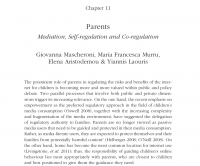Chapter 7: Parents Mediation, Self-regulation and Co-regulation
|
Abstract
The role of parents in regulating the risks and benefits of the internet for children is becoming more and more valued within public and policy debate. However, this increasing relevance of parental mediation is paradoxically counterbalanced by a variety of structural conditions that complicate and partially hinder caregivers' support. Internet risks are much more varied and potentially dangerous than those posed by the broadcast media. Moreover, the design of online devices and environments, as well as their associated frames of use, make it difficult to apply traditional parental mediation strategies to children’s interent use.Thus, while safety policies are increasingly relying on the presumed advantages of parental mediation, the role of family negotiation in framing young people’s access to the internet is taking shape within a material and cultural environment that combines unprecedented responsibilities and challenging hindrances.
This chapter aims at tackling that apparent paradox by proposing a two-step research approach. First, drawing on data from EU Kids Online, we investigate the practices of parental mediation in order to assess their efficacy. In light of these findings, we then present and discuss new ways of connecting policymaking and parental mediation. We argue that the composite and precarious balance implied by processes of parental mediation require alternative frames of policymaking, within which parents as the principal stakeholders together with children can play a crucial role. Finally, we examine the expediency of the active involvement of parents in online safety policy, not only as targets of safer internet messages but also as co-developers of goals and strategies.
Citation
- Mascheroni, Giovanna, Maria Francesca Murru, Elena Aristodemu, and Yannis Laouris. "Parents. Mediation, self-regulation and co-regulation." (2013): 211-226.
